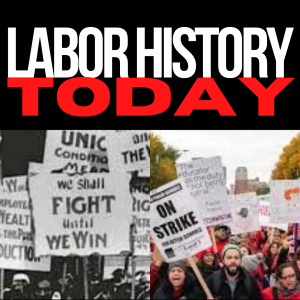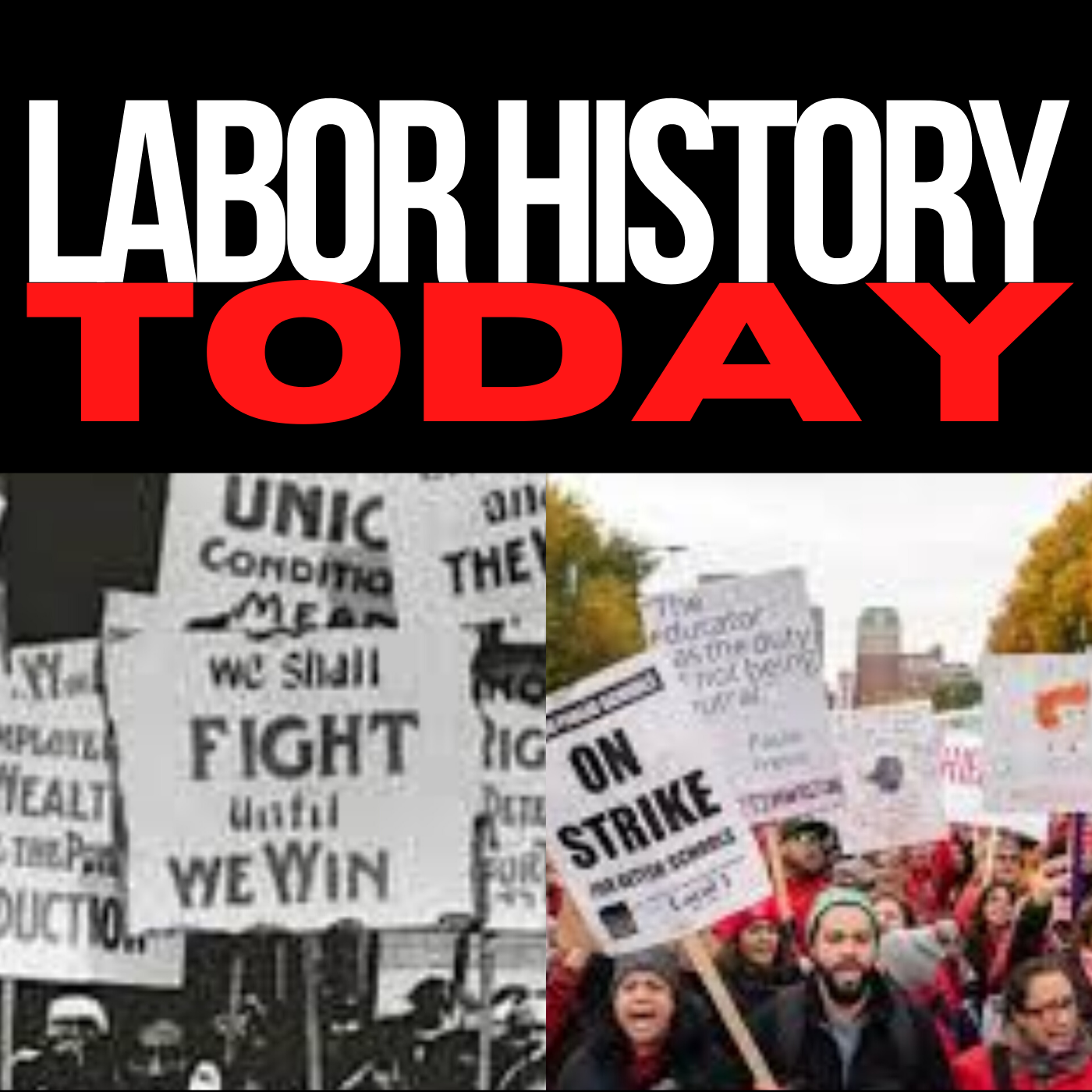Episodes
Episodes



Sunday Apr 09, 2023
Tom Breiding’s songs of struggle
Sunday Apr 09, 2023
Sunday Apr 09, 2023
Labor history in song, from the “Coal Miners’ Balladeer,” performed live at the April 1, 2023 “Annual Commemoration of the History of Working People” put on by the Pennsylvania Labor History Society and The Battle of Homestead Foundation in Windber, Pennsylvania.On this week’s Labor History in Two: The year was 1937. That was the day sparring between Henry Ford and John L. Lewis spilled over into the press.
Questions, comments, or suggestions are welcome, and to find out how you can be a part of Labor History Today, email us at LaborHistoryToday@gmail.com
Labor History Today is produced by Union City Radio and the Kalmanovitz Initiative for Labor and the Working Poor.
#LaborRadioPod #History #WorkingClass #ClassStruggle @GeorgetownKILWP #LaborHistory @UMDMLA @ILLaborHistory @AFLCIO @StrikeHistory #LaborHistory @wrkclasshistory @HomesteadFdn @breiding_tom



Sunday Apr 02, 2023
The 1922-23 Windber Coal Strike
Sunday Apr 02, 2023
Sunday Apr 02, 2023
Yesterday I drove a few hours west through howling wind and driving rain to the little town of Windber, Pennsylvania; a couple miles from Johnstown. The Pennsylvania Labor History Society and The Battle of Homestead Foundation were holding their “Annual Commemoration of the History of Working People” and despite the rough weather the basement hall at the Slovak Educational Club soon filled up with folks eager to hear a daylong program that included commemorating the United Mine Workers 1922-23 Windber strike for union recognition, discussions on “Women in Coal and Steel” and “John Brophy and Labor Education”. As folks sipped their hot coffee and munched on donuts, “Coal Miners’ Balladeer” Tom Breiding regaled them with labor songs. - Chris GarlockNOTE: the last speaker talking about her student days of organizing and diapering her children on the university president’s desk was not Bonnie Boyer but Amy Niehouse.On this week’s Labor History in Two: The year was 1937. That was the day workers sat down at the Hershey chocolate plant in Hershey, Pennsylvania.
Questions, comments, or suggestions are welcome, and to find out how you can be a part of Labor History Today, email us at LaborHistoryToday@gmail.com
Labor History Today is produced by Union City Radio and the Kalmanovitz Initiative for Labor and the Working Poor.
#LaborRadioPod #History #WorkingClass #ClassStruggle @GeorgetownKILWP #LaborHistory @UMDMLA @ILLaborHistory @AFLCIO @StrikeHistory #LaborHistory @wrkclasshistory @HomesteadFdn



Sunday Mar 26, 2023
Erasing Virginia’s labor history
Sunday Mar 26, 2023
Sunday Mar 26, 2023
History standards in Virginia are updated every seven years. The new proposed standards put forth by Governor Glenn Youngkin and his Virginia Department of Education would remove the American labor movement; the state’s labor movement is fighting back, and last week on the Your Rights At Work radio show, we talked with the Virginia Education Association’s Shane Riddle and Brian Peyton from Teamsters 322.
In our second segment, Labor History Today producers Mel Smith and Patrick Dixon get a hands-on feel for labor history when they visit the George Meany Memorial Archives at the University of Maryland College Park, where Ben Blake and Alan Wierdak showed off a collection of construction hardhats and talk about how such physical artifacts provide an entry point -- as well as a key to understanding -- labor history.
On this week’s Labor History in Two: Gompers embraces anti-immigrant legislation.Be sure to stick around at the end of the show for a special bonus; a song by the R.J. Phillips Band which recalls the events of the Columbia Eagle incident in 1970,when two merchant seamen staged a strike – at sea it’s called a mutiny -- against the war in Vietnam.
Questions, comments, or suggestions are welcome, and to find out how you can be a part of Labor History Today, email us at LaborHistoryToday@gmail.com
Labor History Today is produced by Union City Radio and the Kalmanovitz Initiative for Labor and the Working Poor.
#LaborRadioPod #History #WorkingClass #ClassStruggle @GeorgetownKILWP #LaborHistory @UMDMLA @ILLaborHistory @AFLCIO @StrikeHistory #LaborHistory @wrkclasshistory @riddle_shane of @VEA4Kids @IBTLocal322 @Virginia_AFLCIO @VirginiaUnified @Teamsters



Sunday Mar 19, 2023
The Strange Career of “the Working Class”
Sunday Mar 19, 2023
Sunday Mar 19, 2023
Originally broadcast March 17, 2019On this week’s show: Robyn Leigh Muncy, whose article “The Strange Career of ‘the Working Class’ in US Political Culture Since the 1950s” was published in the December issue of "Labor: Studies in Working Class History." Professor Muncy is Director of the Honors Program in the Department of History at the University of Maryland, College Park.Plus, in this week’s “Cool things from the George Meany Labor Archives,” Alan, Chloe and Ben discover something unexpected in their “Miscellaneous” folder for the 1912 Lawrence textile strike.Interviews by Chris Garlock, Patrick Dixon and Allan Wierdak.
Questions, comments, or suggestions are welcome, and to find out how you can be a part of Labor History Today, email us at LaborHistoryToday@gmail.com
Labor History Today is produced by Union City Radio and the Kalmanovitz Initiative for Labor and the Working Poor.
#LaborRadioPod #History #WorkingClass #ClassStruggle @GeorgetownKILWP #LaborHistory @UMDMLA @ILLaborHistory @AFLCIO @StrikeHistory #LaborHistory @wrkclasshistory



Sunday Mar 12, 2023
Fred Redmond: “Why Labor History Is Important”
Sunday Mar 12, 2023
Sunday Mar 12, 2023
The AFL-CIO Secretary-Treasurer – and former steel worker – tells the Battle of Homestead Foundation “We have to tell the truth about labor history, the good, and the bad, and the ugly.” Plus: Pete Seeger sings The Homestead Strike Song.On this week’s Labor History in Two: The year was 1912. The Lawrence textile workers strike had worn on for over a month. More than 20,000 workers had walked off the job…
Questions, comments, or suggestions are welcome, and to find out how you can be a part of Labor History Today, email us at LaborHistoryToday@gmail.com
Labor History Today is produced by Union City Radio and the Kalmanovitz Initiative for Labor and the Working Poor.
#LaborRadioPod #History #WorkingClass #ClassStruggle @GeorgetownKILWP #LaborHistory @UMDMLA @ILLaborHistory @AFLCIO @StrikeHistory #LaborHistory @wrkclasshistory @STRedmond @HomesteadFdn @LizShuler



Sunday Mar 05, 2023
The Tractor Princess
Sunday Mar 05, 2023
Sunday Mar 05, 2023
Today’s show celebrates Women’s History Month and comes to us from Re:Work, the podcast from the UCLA Labor Center that for the last decade has elevated stories of work to humanize and break down economic and racial justice issues. It's produced by Veena Hampapur and Saba Waheed.Their latest episode is “The Tractor Princess” and it draws on excerpts from an oral history interview with Antoinette Yvonne DeOcampo-Lechtenberg, which is a part of a community archive and research initiative called Watsonville is in the Heart, which highlights the stories of Filipino families from the greater Pajaro Valley region in California.On this week’s Labor History in Two: This was the day President Franklin Roosevelt named Frances Perkins Secretary of Labor.
Questions, comments, or suggestions are welcome, and to find out how you can be a part of Labor History Today, email us at LaborHistoryToday@gmail.com
Labor History Today is produced by Union City Radio and the Kalmanovitz Initiative for Labor and the Working Poor.
#LaborRadioPod #History #WorkingClass #ClassStruggle @GeorgetownKILWP #LaborHistory @UMDMLA @ILLaborHistory @AFLCIO @StrikeHistory #LaborHistory @wrkclasshistory @rework_radio



Sunday Feb 26, 2023
Buffalo Soldier turned revolutionary
Sunday Feb 26, 2023
Sunday Feb 26, 2023
Two more stories for Black History Month: From former auto worker Jonathan Melrod, the fascinating story of David Fagen, who joined the U.S. Army to escape Jim Crow discrimination, and was sent to the Philippines, where not only did he and his fellow Black soldiers suffer from endemic racism in the military, but found that they were fighting on the wrong side of the U.S. war of Philippine conquest.
Then, Labor History Today correspondent Alan Wierdak talks with Caleb Smith, a PhD student at Tulane about an important Title 7 discrimination lawsuit involving Harris Parson, a Black Korean War vet who went to work at Kaiser Aluminum and Chemical in Bogalusa, Louisiana. On this week’s Labor History in Two: Remembering E.D. Nixon.
Questions, comments, or suggestions are welcome; to find out how you can be a part of Labor History Today, email us at LaborHistoryToday@gmail.com
Labor History Today is produced by Union City Radio and the Kalmanovitz Initiative for Labor and the Working Poor.
#LaborRadioPod #History #WorkingClass #ClassStruggle @GeorgetownKILWP #LaborHistory @UMDMLA @ILLaborHistory @AFLCIO @StrikeHistory #LaborHistory @wrkclasshistory @JonathanMelrod @HornbakeLibrary



Sunday Feb 19, 2023
Celebrating Black History Month (Encore)
Sunday Feb 19, 2023
Sunday Feb 19, 2023
(Originally aired February 17, 2019)On this week’s show: William P. Jones on “The March on Washington: Jobs, Freedom, and the Forgotten History Of Civil Rights,” plus a 1961 memo to George Meany about the Freedom Rides, and a confidential “report on union racial progress.” Interviews by Chris Garlock and Alan Wierdak.
Sweet Honey In The Rock - Eye On The Prize"CORE: Freedom Ride," 1961Questions, comments or suggestions welcome, and to find out how you can be a part of Labor History Today, email us at LaborHistoryToday@gmail.com
Labor History Today is produced by Union City Radio and the Kalmanovitz Initiative for Labor and the Working Poor. Produced & engineered by Chris Garlock and Patrick Dixon.




